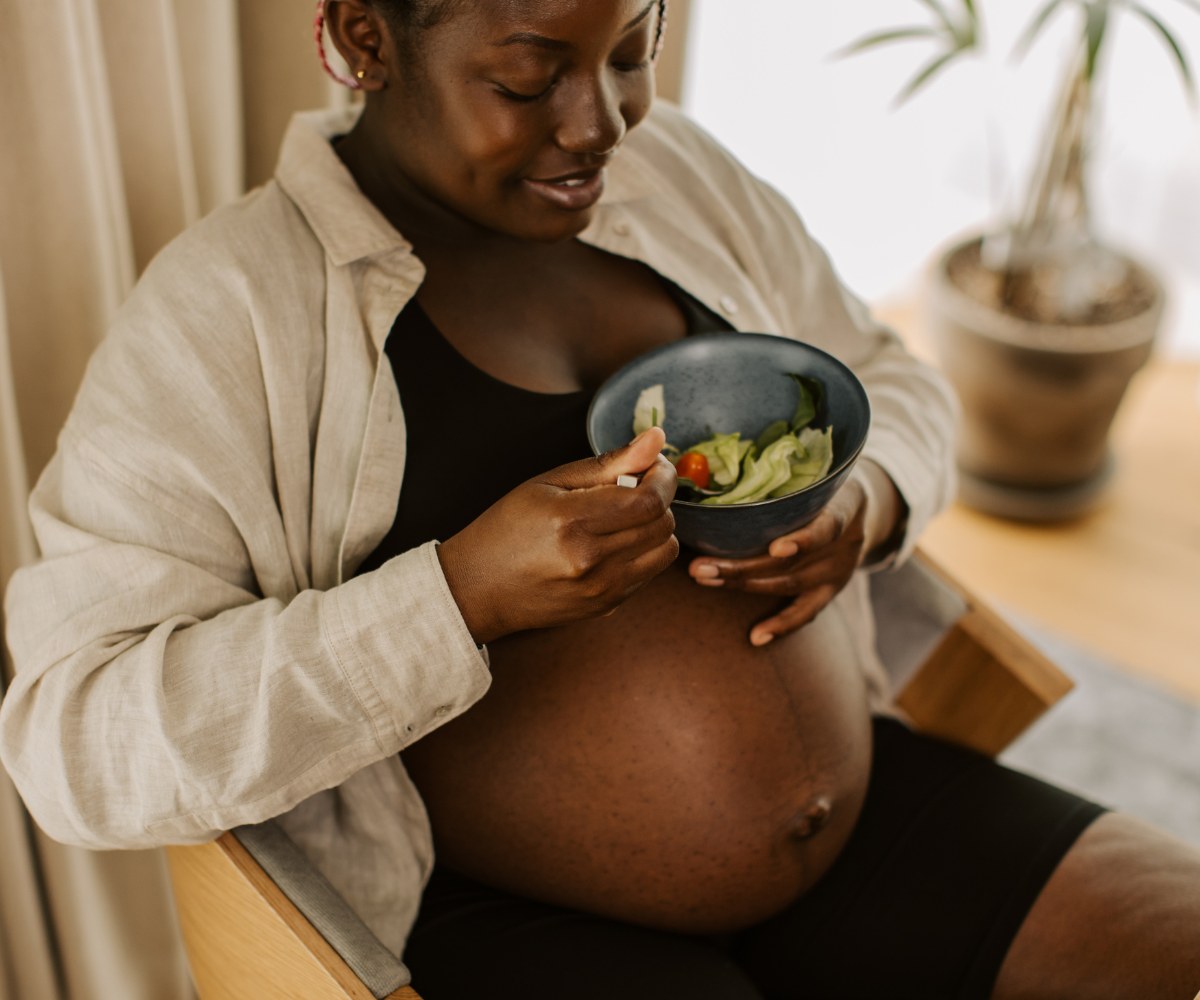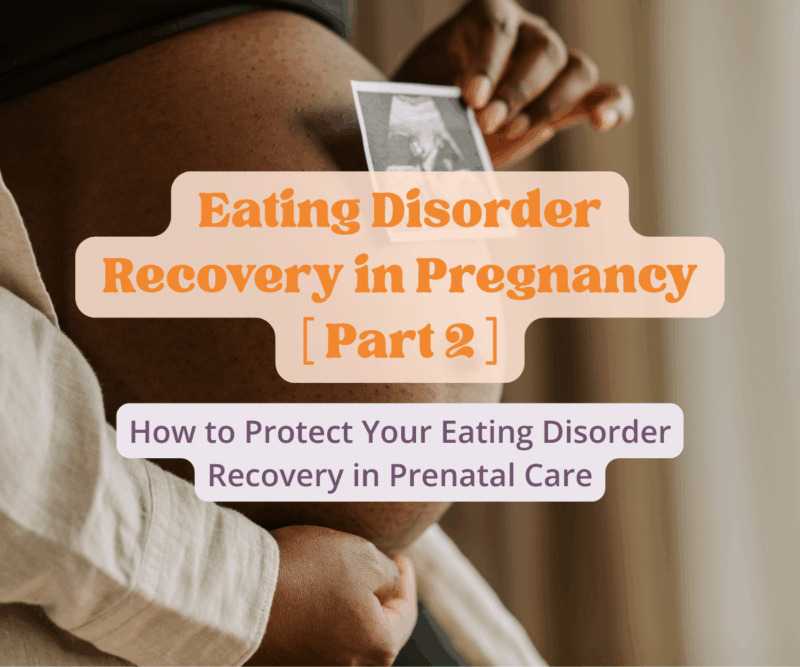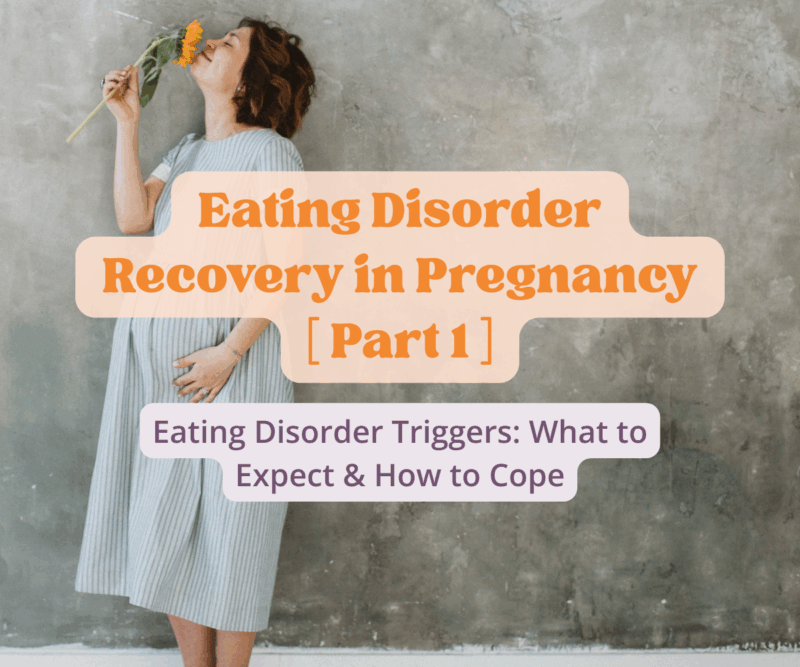You’re chugging along in your pregnancy – coping with the discomfort(s), stocking up on alllll the baby gear (and cute outfits) and finally starting to really feel those baby kicks. Then, sometime around week 24-28, you get to drink a delicious (*sarcasm*) mocktail lovingly known as the glucose tolerance test that screens for gestational diabetes.
What happens if your blood sugar doesn’t fall back to the normal range and you wind up diagnosed with gestational diabetes? Well, if you’re anything like the women I work with, you’re probably feeling a whole lot of stress.
The stress often begins with feeling like you’ve “failed” this test (this is literally the terminology used by providers which, like, can we not???). And it continues as you start to worry about your health, the health of your baby, and whether or not you did anything wrong.
If you’re feeling this way, or you’re stressing about possibly testing positive for gestational diabetes, I want to help you take a deep breath.
Let’s dive into a nuanced, neutral discussion about gestational diabetes and how to manage it without sabotaging your mental health.
What is gestational diabetes?
Put simply, gestational diabetes (GDM) is a condition of elevated blood sugar that occurs only during pregnancy. It’s estimated to occur somewhere between 2-10% of pregnancies, and affects women of all shapes and sizes. It typically resolves after giving birth.
Untreated gestational diabetes can lead to complications for both mom and baby.
Mom’s blood supply nourishes the baby in-utero. When blood sugar is elevated, the fetus may produce more insulin than it needs once it’s born. This can lead the baby to experience hypoglycemia (low blood sugar) after birth.
Thankfully, it’s totally possible to manage gestational diabetes with nutrition and lifestyle habits that help you feel your best. And, no, (spoiler alert) that doesn’t mean you have to count every gram of carb you eat or go keto.
What causes gestational diabetes?
All pregnant people experience some level of insulin resistance during pregnancy. This happens because of hormones produced by the placenta. In order to ensure that the fetus is able to get enough sugar for energy and growth, there has to be a little leftover in mom’s blood supply.
Gestational diabetes occurs when the placenta hormones make mom’s cells a little too insulin-resistant, or when mom’s pancreas isn’t able to produce enough insulin in response.
It’s often repeated is that being “overweight” puts you at greater risk for developing gestational diabetes. But let’s be clear: this doesn’t mean that having a BMI that’s higher than “normal” before pregnancy means you WILL develop gestational diabetes, or that if you do, your weight is the problem.
There’s a lot we could unpack here, and I’m sure I will in future posts. For one thing, most research that draws conclusions between body weight and disease risk fails to consider the greater impact of weight stigma or eating disorders on health outcomes (both of which are experienced by individuals in larger bodies and can directly cause harm).
Your weight isn’t a health behavior. Rather than use weight as the primary target to reduce your risk, focus on actual behaviors that can help promote blood sugar balance before you get pregnant.
Sidenote: weight cycling, or constantly swinging between periods of weight loss and weight regain (ie. chronic dieting), is incredibly taxing for the body and has been shown to increase insulin resistance over time. One of the best things you can do to promote blood sugar balance is stop dieting once and for all.
Here’s the most important point to remember: You can’t control whether or not you get gestational diabetes. You could be in “perfect” (those are some really big air quotes) health before pregnancy and still wind up with gestational diabetes. It’s not an inherently shameful diagnosis and doesn’t mean anything about your value as a mom or human. It’s important to learn how to manage it without shame to promote the health of not only your baby, but yours (mental & physical) as well.
The problem with the current approach to GDM care
Unfortunately, it’s so common to experience shame and guilt when diagnosed with gestational diabetes. Medical providers who are weight-biased or lack an understanding of the impacts of weight stigma can provide unintended harm by insinuating that you can avoid developing gestational diabetes by carefully managing weight gain during pregnancy or by restricting your diet.
Once diagnosed, pregnant moms with gestational diabetes are either left to figure things out on their own (leaving themselves incredibly vulnerable to diet culture that is ready and waiting to swoop in), or receive overwhelming nutrition guidance that feels extra restrictive. This can be incredibly triggering for anyone with a history of an eating disorder or disordered eating – which emerging research shows is much more common than once assumed.
As a whole, the current approach to managing gestational diabetes treats pregnant moms more like robots than people with real emotions, life experiences, fears, and values. A mom who has gestational diabetes is a whole-ass human who deserves individual, non-stigmatizing support for managing blood sugar during pregnancy – not a shame or fear-based approach that is only likely to leave her feeling more confused by food and her body for years to come.
Gestational diabetes is complex – it’s not black and white. It isn’t “caused” by eating a certain food or existing in a certain size body. We shouldn’t be treating it as such.
How a weight-inclusive approach can help
While it’s frustratingly not the norm, approaching gestational diabetes from a weight-inclusive lens could be a total game-changer. Taking weight control out of the equation allows pregnant moms to focus on making truly supportive changes. All without any unwarranted shame, guilt and stress associated with body weight.
Perhaps it’s not surprising that weight bias (the assumption that smaller bodies are healthier) runs wild in conventional approaches to treat gestational diabetes. Moms may wind up following a gestational diabetes diet that looks and smells a lot like a diet designed for weight loss – full of rules, rigidity, and “low-carb” lingo.
The problem with overly restrictive diets in treatment of gestational diabetes is no different than the problem with diets in general: they lead to a sense of deprivation and “load the gun” for out-of-control eating experiences later on.
Is it possible to manage gestational diabetes without a rigid diet? For most people, yes! In fact, a flexible, intuitive approach infused with gentle nutrition strategies for blood sugar balance is supported by research as an effective way to manage gestational diabetes.
How to get started with gentle nutrition for gestational diabetes
If you’ve been diagnosed with gestational diabetes and are in the middle of stressing out about what this means for your health and your relationship to food, I hear you.
It might feel like you have no choice but to start counting calories and carbs, micromanaging your portions, or ignoring your hunger cues. But, friend, that is just not the truth.
It’s totally possible to navigate gestational diabetes without cutting out a single food or becoming overly rigid with your eating habits. Managing gestational diabetes from a gentle, non-diet approach is about learning what works for YOUR body and YOUR values.
If you’re ready to start working with a provider who gets it, and who won’t instill the fear of carbs into you, (promise!!!) I’m here for you. Send me a message and we can get started today.





